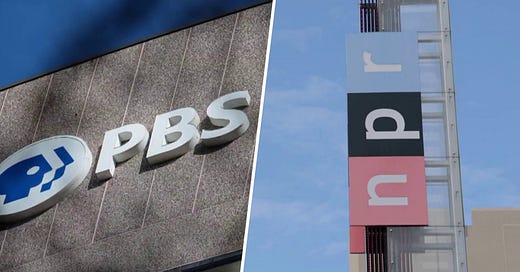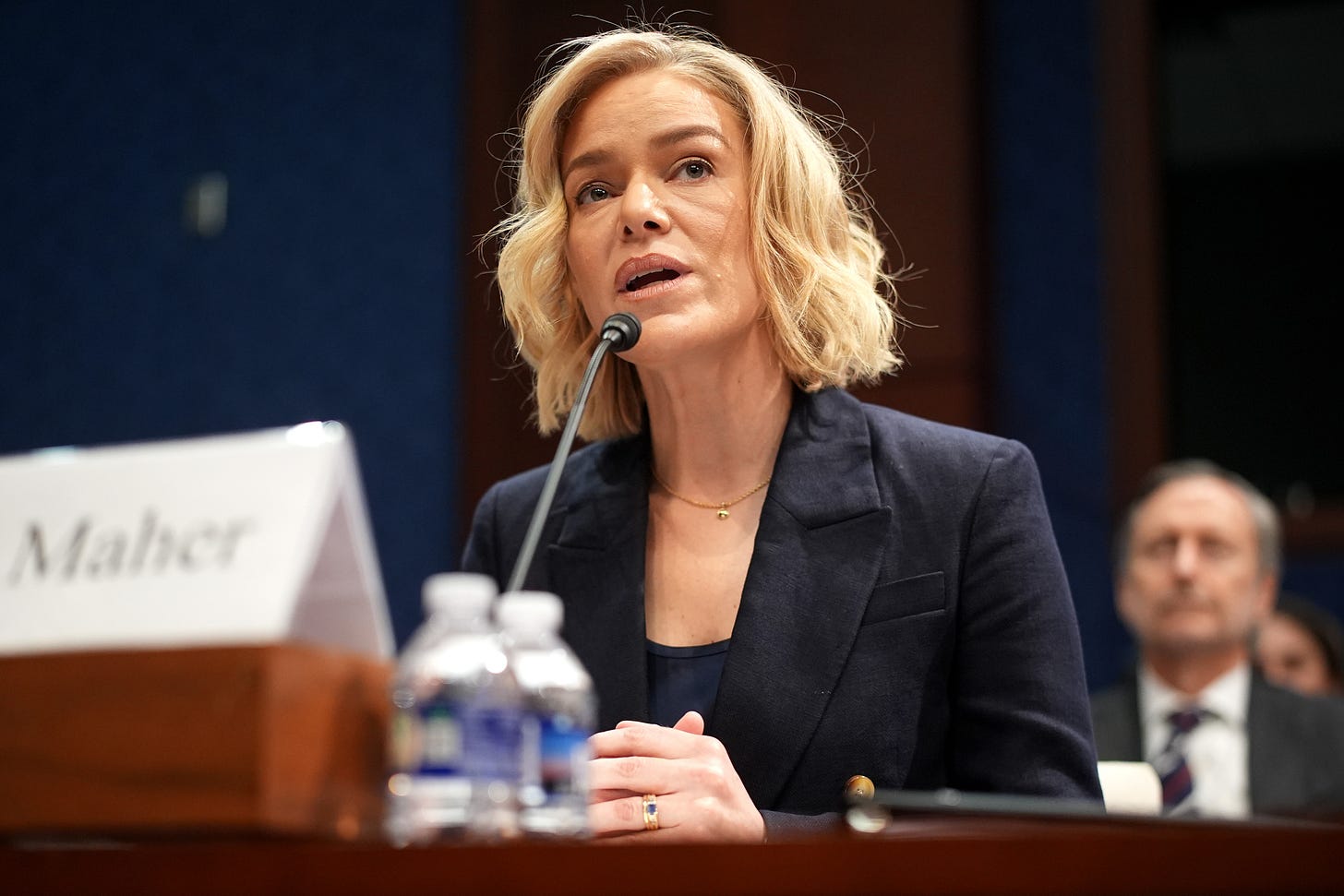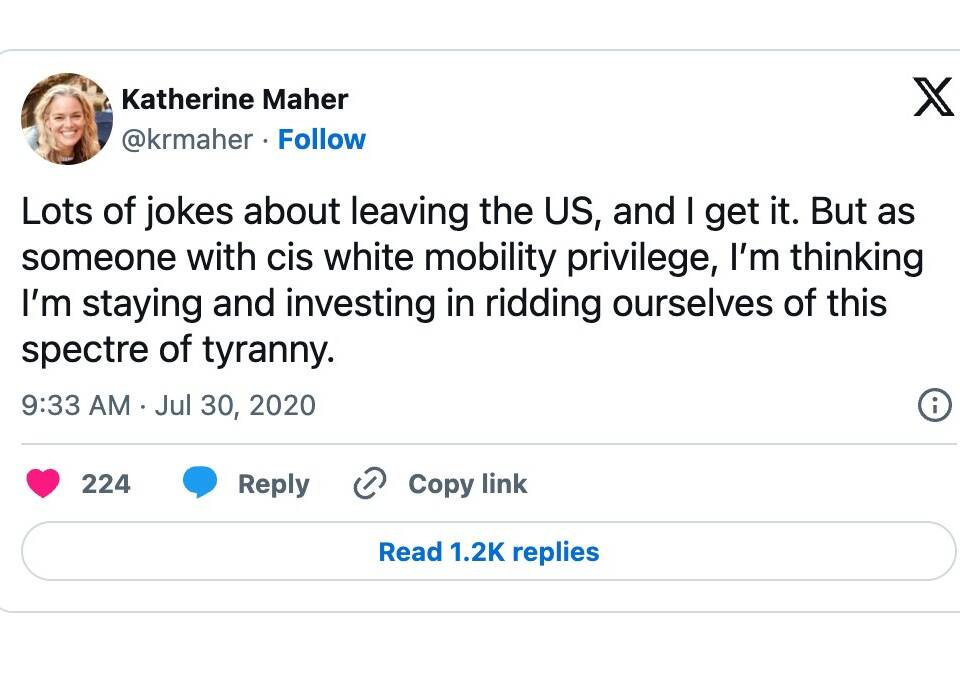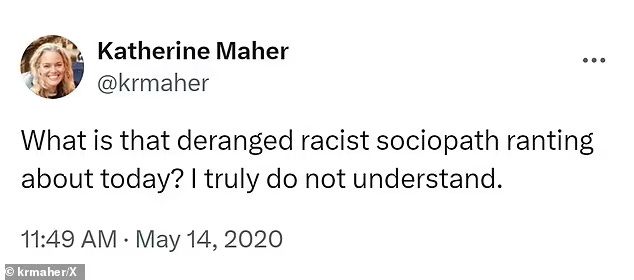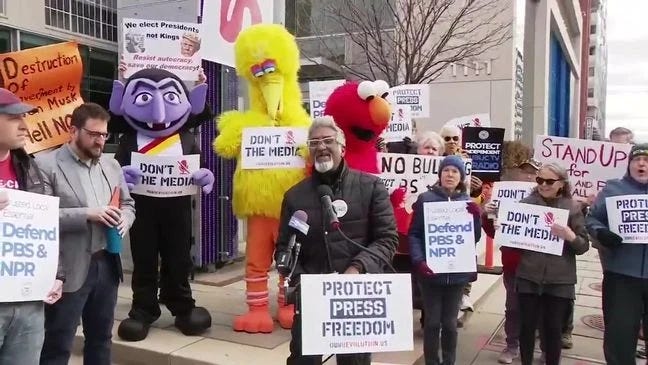The Great Public Funding Purge
Defunding NPR and PBS is playing out like a satirical opera in three acts
Ladies and gentlemen, gather 'round the radio dial, for we are going to embark on a rollicking tale of defunding National Public Radio (NPR) and the Public Broadcasting Service (PBS) — those bastions of “earnest” reporting and tote-bag giveaways.
Picture this: the airwaves filled with the rustic tones of NPR’s A Prairie Home Companion … or the gentle clinking of PBS pledge-drive coffee mugs during a break of a “Doo-Wop Revival.” That was 10 years ago. Today, you’ll hear all about the challenges of Drag Queen Story Hour, or the latest on marginalized climate change groups.
So, the Trumpzilla administration, tired of “un-American” chatter eminating from public broadcasting, said “enough” and is cutting federal funding via Executive Order.
Is talking about “defunding” actually a free speech issue? Or is it a liberation from taxpayer-funded navel-gazing? In deference to NPR whistleblower Uri Berliner, NPR CEO Katherine Maher, and a few choice “news” segments, it makes you ponder — is the dial stuck on ideological caterwauling?
Act I: Uri Berliner, the Rebel without a cause
Once upon a time, in the beatified halls of NPR’s Washington, D.C., office, senior editor Berliner looked around and noticed something peculiar: the newsroom was a sea of progressive Democrats with nary a Republican in sight. Sort of like Harvard, but without the Ivy, Baccarat wine glasses and stylish keffiyehs.
In his 2024 essay for The Free Press, Berliner spilled the beans, revealing that NPR’s staff was so uniformly left-leaning — 87 registered Democrats, zero Republicans — that it resembled a political monoculture more than a public broadcasting company.
Berliner was a 25-year NPR journalist and, until then, in good standing with all things liberal. But this didn’t sit well with him. He didn’t call for defunding NPR outright, mind you, but his critique was a hard jab at the network’s claim of impartiality. He pointed out that NPR’s coverage had veered into what you might call “woke autopilot.” Real news — Russiagate, COVID origins, the Hunter Biden laptop — was ignored.
For instance, take their 2023 segment on “queer animals,” which explored the homosexual antics of penguins and dolphins with the gravitas of a UN climate summit. Fascinating? Maybe. Essential public journalism? Uhhh…
For instance, take their 2023 segment on “queer animals,” which explored the homosexual antics of penguins and dolphins with the gravitas of a UN climate summit. Fascinating? Sure. Essential public journalism?
Or consider NPR’s breathless reporting on climate change, where every heatwave is an existential crisis, and the solution is always more funding for green initiatives (and, presumably, more NPR segments about it). Then there’s the segment about racism in horticulture, where the genteel gardeners suddenly became stridently bigoted. Berliner argued that this relentless focus on identitarian politics — race, gender, climate justice — had alienated much of the country.
Berliner reported all of this on April 9 of last year. Within a week, he became a pariah in the newsroom, was suspended and ostricized as a traitor. then resigned.
Act II: Katherine Maher, the Maestro of Messaging
Enter Maher, NPR’s CEO since March 2024, a woman whose social media history reads like a progressive manifesto written in glitter pen.
Maher once tweeted (on the X platform formerly known as Twitter) that America began in “black plunder and white democracy” and mused about the merits of “punching Nazis.”
Some others …
At a March 2025 House hearing, she faced a grilling from Rep. Marjorie Taylor Greene, who waved Berliner’s essay like a matador’s cape. Maher admitted NPR flubbed the Hunter Biden laptop story in 2020 (a “non-story,” apparently), and was super bullish on masking mandates during the COVID pandemic, but insisted her network was the gold standard of “unbiased, nonpartisan, fact-based reporting.”
The room stifled a collective chuckle. Some dared to laugh out loud.
Maher’s defense of NPR’s funding — about $500 million annually from the Corporation for Public Broadcasting (CPB) — was an earnest but highly tone deaf treatise in deflection. She argued that defunding NPR would gut rural stations and deprive Americans of “essential” programming.
Essential programming? PBS, NPR’s publicly funded cousin, aired a documentary on a transgender teenager, framed as a moral imperative for viewers to embrace gender fluidity. Noble? Perhaps. But when every other segment preaches the same gospel — climate doom, racial reckoning, or gender identity — skeptics like Berliner wonder if “public” broadcasting is less about serving the nation and more about serving a relentless worldview.
Maher vowed to fight Trump’s May 2025 executive order to cut CPB funding “using all means available.” She claimed defunding was an “affront to the First Amendment,” which is a bit like saying cutting your allowance violates your right to free speech. Meanwhile, PBS CEO Paula Kerger warned that defunding would endanger children’s programming like Sesame Street. (Because nothing says “Elmo’s in peril” … like the budget cut that licensed its Sesame Street characters to HBO/Max more than 10 years ago.)
Act III: Pulling the Plug
So, why defund NPR and PBS?
Let’s be clear: this isn’t about silencing them. They can broadcast their climate jeremiads and identitarian deep dives till the cows come home (or until the cows are deemed non-binary). The issue is why taxpayers — red, blue, and purple — should foot the bill for outlets that, as Berliner exposed, often cater to a sliver of the population: urban, affluent, and pronoun proud.
The CPB’s $500 million subsidy is a drop in the federal bucket (0.0001 percent of the budget, Maher notes), but it’s still real money. Why should a trucker in Tulsa subsidize a PBS documentary on “decolonizing yoga” or an NPR segment on “how climate change disproportionately affects marginalized communities?”
The irony is that NPR and PBS could thrive without public funds. NPR’s budget gets only 1 percent from CPB directly, with local stations relying on grants for more. PBS is owned by its member stations, which rake in donations from viewers like you and those tote-bag enthusiasts. If their programming is as “essential” as Maher claims, surely the free market corporate foundations will keep them afloat.
Epilogue: A Dial Turned to Freedom
In the end, defunding NPR and PBS isn’t about free speech or censorship; it’s about fairness. Berliner tried to warn us — a public broadcaster that caters to a small percentage of the population isn’t public at all. Maher’s insistence on NPR’s neutrality is as convincing as a fox guarding the henhouse. Their news segments are unequivocally slanted, leaving conservatives, libertarians, moderates and even some liberals feeling like they’re funding a cultural revolution lecture series.
So, let’s pull the plug on the CPB’s gravy train. NPR and PBS can survive, maybe even thrive, without forcing taxpayers to bankroll their biases.
And who knows? Maybe they’ll discover the joy of crowdfunding, where every pledge comes with a free sticker and the warm glow of not sticking it to the American taxpayer.
Until then, I’ll be tuning my radio to static — gloriously unbiased, publicly funded static.
###
Jim Geschke was inducted into the prestigious Marquis “Who’s Who” registry in 2021.


